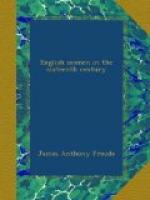The Duke was delighted with himself. The fire-ships burnt harmlessly out. He had baffled the inventions of the endemoniada gente. He brought up a league outside the harbour, and supposed that the whole Armada had done the same. Unluckily for himself, he found it at daylight divided into two bodies. The San Martin with forty of the best appointed of the galleons were riding together at their anchors. The rest, two-thirds of the whole, having no second anchors ready, and inexperienced in Channel tides and currents, had been lying to. The west wind was blowing up. Without seeing where they were going they had drifted to leeward, and were two leagues off, towards Gravelines, dangerously near the shore. The Duke was too ignorant to realise the full peril of his situation. He signalled to them to return and rejoin him. As the wind and tide stood it was impossible. He proposed to follow them. The pilots told him that if he did the whole fleet might be lost on the banks. Towards the land the look of things was not more encouraging.
One accident only had happened the night before. The Capitana galleass, with Don Hugo de Moncada and eight hundred men on board, had fouled her helm in a cable in getting under way and had become unmanageable. The galley slaves disobeyed orders, or else Don Hugo was as incompetent as his commander-in-chief. The galleass had gone on the sands, and as the tide ebbed had fallen over on her side. Howard, seeing her condition, had followed her in the Ark with four or five other of the Queen’s ships, and was furiously attacking her with his boats, careless of neutrality laws. Howard’s theory was, as he said, to pluck the feathers one by one from the Spaniard’s wing, and here was a feather worth picking up. The galleass was the most splendid vessel of her kind afloat, Don Hugo one of the greatest of Spanish grandees.
Howard was making a double mistake. He took the galleass at last, after three hours’ fighting. Don Hugo was killed by a musket ball. The vessel was plundered, and Howard’s men took possession, meaning to carry her away when the tide rose. The French authorities ordered him off, threatening to fire upon him; and after wasting the forenoon, he was obliged at last to leave her where she lay. Worse than this, he had lost three precious hours, and had lost along with them, in the opinion of the Prince of Parma, the honours of the great day.
Drake and Hawkins knew better than to waste time plucking single feathers. The fire-ships had been more effective than they could have dared to hope. The enemy was broken up. The Duke was shorn of half his strength, and the Lord had delivered him into their hand. He had got under way, still signalling wildly, and uncertain in which direction to turn. His uncertainties were ended for him by seeing Drake bearing down upon him with the whole English fleet, save those which were loitering about the galleass. The English had now the advantage




